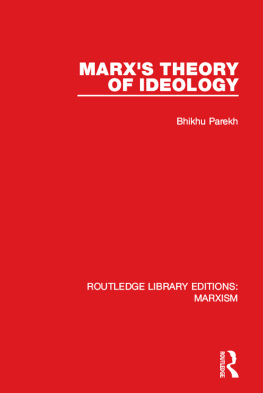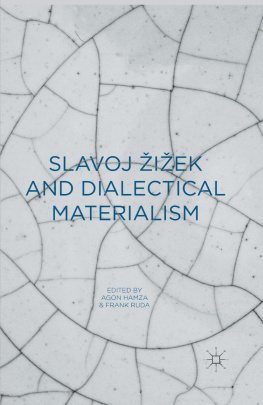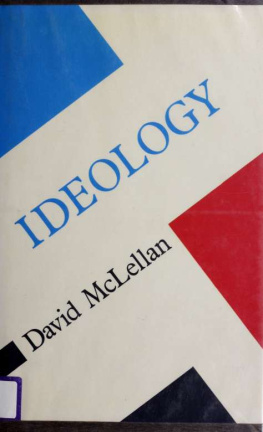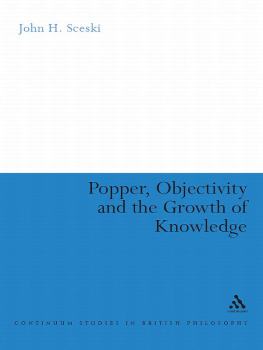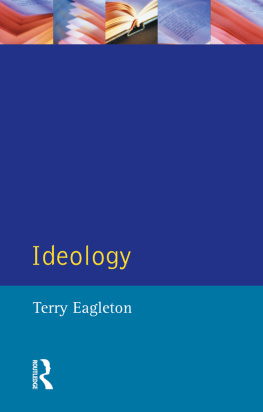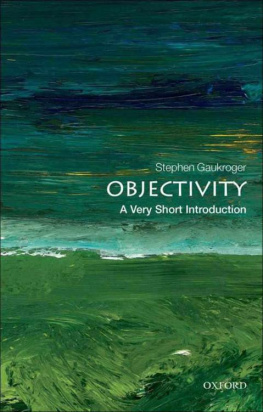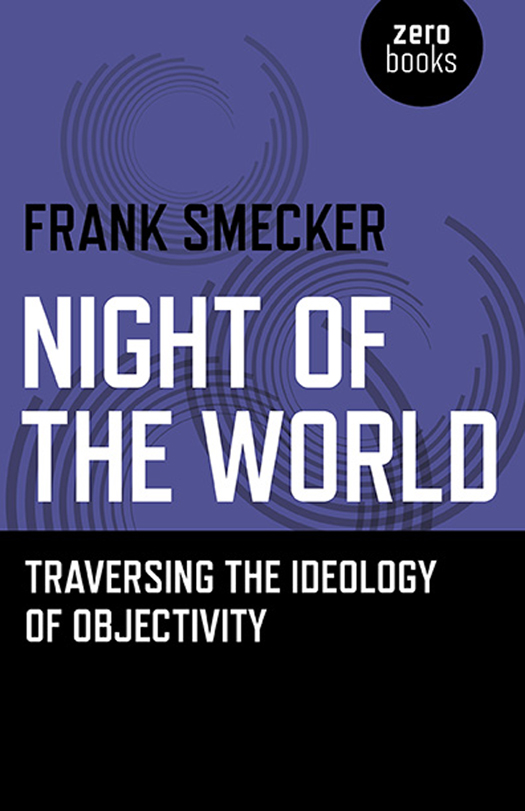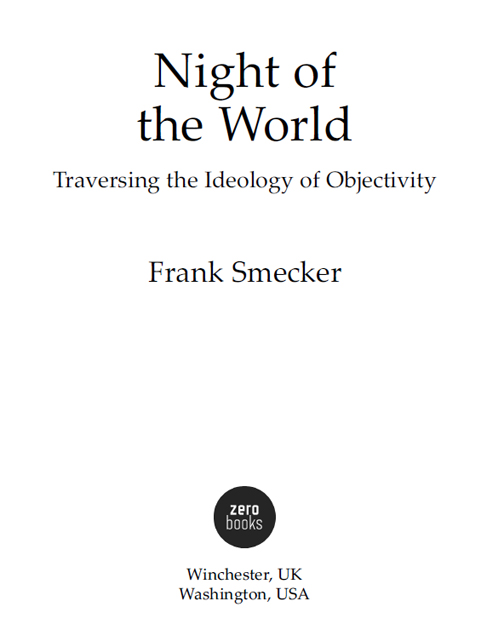WHAT PEOPLE ARE SAYING ABOUT
NIGHT OF THE WORLD
The Night of the World seamlessly weaves through complex philosophical conjunctions and cultural practices in order to articulate a theory of ideology for todays world. Smecker argues that objectivity has become the prevailing ideological form, but he refuses to surrender the terrain of objectivity to ideology. His book is a struggle against this ideological structure in an effort to reclaim a new mode of objectivity that has its basis in the contradictions of subjectivity. It provides a thorough overview of the ways that contemporary ideology penetrates into our being and proffers a political antidote.
Todd McGowan, author of Enjoying What We Dont Have: The Political Project of Psychoanalysis
With this profound, provocative, difficult, and important book, Frank Smecker delivers a much needed kick in the pants to Western Philosophy. Thank you, Frank, for your courage.
Derrick Jensen
An original, truly refreshing endeavour to situate objectivity at the level of ideology. Smecker makes use of ieks trademark blend of Hegel and Lacan to delve into, unpack and reconfigure what we regard as objective reality. More importantly, he reminds us that any blind acceptance of objectivity today equals serving the interests of capital and feeding the criminal divisions it produces.
Fabio Vighi, Co-director of the iek Centre for Ideology Critique at Cardiff University, UK
First published by Zero Books, 2014
Zero Books is an imprint of John Hunt Publishing Ltd., Laurel House, Station Approach,
Alresford, Hants, SO24 9JH, UK
www.johnhuntpublishing.com
www.zero-books.net
For distributor details and how to order please visit the Ordering section on our website.
Text copyright: Frank Smecker 2013
ISBN: 978 1 78279 180 5
All rights reserved. Except for brief quotations in critical articles or reviews, no part of this book may be reproduced in any manner without prior written permission from the publishers.
The rights of Frank Smecker as author have been asserted in accordance with the Copyright, Designs and Patents Act 1988.
A CIP catalogue record for this book is available from the British Library.
Design: Stuart Davies
Printed and bound by CPI Group (UK) Ltd, Croydon, CR0 4YY
We operate a distinctive and ethical publishing philosophy in all areas of our business, from our global network of authors to production and worldwide distribution.
CONTENTS
Gentlemen! We find ourselves in an important epoch, in a fermentation, in which Spirit has made a leap forward, has gone beyond its previous concrete form and acquired a new one. The whole mass of ideas and concepts that have been current until now, the very bonds of the world, are dissolved and collapsing into themselves like a vision in a dream. A new emergence of Spirit is at hand; philosophy must be the first to hail its appearance and recognize it, while others, resisting impotently, adhere to the past, and the majority unconsciously constitute the matter in which it makes its appearance. But philosophy, in recognizing it as what is eternal, must pay homage to it.
Hegel, Lectures at Jena of 1806, final speech
Preface:
In which the premises will eventually come out
In that minor text of Jack D. Forbes, Columbus and OtherCannibals, the author addresses the Cree notion of Wtiko, a term that denotes the cannibal, or, to be more precise, diabolical wickedness or cannibalism.from ourselves tooour inner-worlds are alien, they insist beyond just mere bodily existence, to the point of exceeding physical limits: For how is it that, the stuff of mind, thought itself, can elude physical measurement while yet, it controls our physical bodiesespecially when anything that is able to budge something physical is itself supposed to be physical, too? No less important, our thoughts are always about something other than the empty framework of thought itself, our desires often the desire of (the Others) Desire.
And what of the occurrence of thought itselfthought without any external object, an experience of radical self-withdrawalsubjective alienation; the human reduced solely to the abyssal point of thinking, a purely formal emptiness as such? According to that medial figure in the development of German Idealism, Friedrich Schelling, before becoming the rational medium of the world the subject is, at its very basis, an infinite lack of being (unendliche Mangel an Sein). This interminable, immutable lack of being, a withdrawal from the world itself by which the existence of reality is suspended to mere illusion, describes what is known well in psychoanalysis as psychotic withdrawal. In his essay The Three Events of Philosophy, iek raises an excellent point: Does this withdrawal-into-self, a madness as such, not also bespeak of the humans departure from its natural environmentthereby designating the end of the animal self and thus marking the emergence of humanization?
Madness, then, as iek puts it, is that inevitable vanishing mediator, a repressed element that is crucial for the advent of a new, symbolic, framework: can we not suppose, then, that the
We are ideological beings, each and every one of us estranged from the material reality of our own specious universes.
There is no overcoming of this alienation, no escape from this horrific disjunction, this original cleft in nature. There is only acceptance. Ideology is, in a way, the creative result of our immutable attempts at developing this radical imbalance into expressions of how to be in the world. As such, ideology represents to us and for us our unconscious fantasies, which are reflected back to us in our lived realities in the guise of an objective reality; reflected in our conscious experiences /perceptions of the world as such. Wtiko should therefore be likened not so much to a sickness synonymous with drive, and certainly not something endemic only to Western culture and/or civilization, but rather, it should be likened precisely to the violence that inevitably ensues from a disgust at life, a disgust at drive at its purest; thus Wtiko should be likened to the violence that ensues from the attempt to abolish the radical imbalances around which drive incessantly circulates.
Perhaps then, Wtiko should be likened to the socio-ideological metaphor of garden, for the typical garden that comes to most peoples minds is the one that, by its very nature, demands for the destructive removal of those insufferable weeds, ensuring the suppression of their fullest growth and appearance for the sake of the perfect garden. Does this tyranny of cultivation, so to speak, an ideology of diabolical wickedness if there ever was one, not arise from the very aspiration to abolish the radical antagonism through which man cuts his umbilical cord with nature?
In other words, there is no organic harmony, no natural balance we must strive to return to; belief in this ecological ideology only follows the same old logic of tyrannyIs it not the case that the worlds most horrific atrocities, holocausts and mass murders were carried out in the name of harmonious being and claims to virtue? And what of those exceptions to the harmonious whole, those intolerable, excessive weeds that just wont


